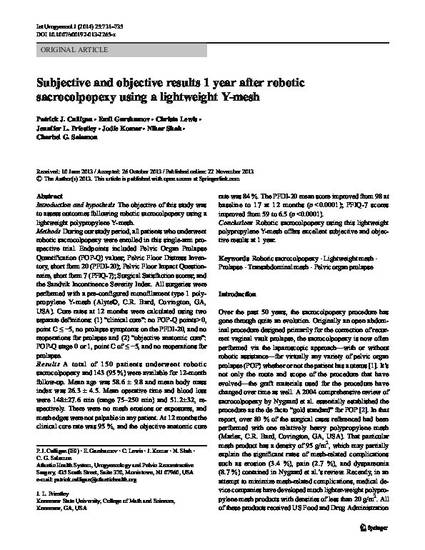
Introduction and hypothesis: The objective of this study was to assess outcomes following robotic sacrocolpopexy using a lightweight polypropylene Y-mesh. Methods: During our study period, all patients who underwent robotic sacrocolpopexy were enrolled in this single-arm prospective trial. Endpoints included Pelvic Organ Prolapse Quantification (POP-Q) values; Pelvic Floor Distress Inventory, short form 20 (PFDI-20); Pelvic Floor Impact Questionnaire, short form 7 (PFIQ-7); Surgical Satisfaction scores; and the Sandvik Incontinence Severity Index. All surgeries were performed with a pre-configured monofilament type 1 polypropylene Y-mesh (Alyte©, C.R. Bard, Covington, GA, USA). Cure rates at 12 months were calculated using two separate definitions: (1) 'clinical cure': no POP-Q points > 0, point C ≤ −5, no prolapse symptoms on the PFDI-20, and no reoperations for prolapse and (2) 'objective anatomic cure': POP-Q stage 0 or 1, point C of ≤ −5, and no reoperations for prolapse. Results: A total of 150 patients underwent robotic sacrocolpopexy and 143 (95 %) were available for 12-month follow-up. Mean age was 58.6 ± 9.8 and mean body mass index was 26.3 ± 4.5. Mean operative time and blood loss were 148 ± 27.6 min (range 75-250 min) and 51.2 ± 32, respectively. There were no mesh erosions or exposures, and mesh edges were not palpable in any patient. At 12 months the clinical cure rate was 95 %, and the objective anatomic cure rate was 84 %. The PFDI-20 mean score improved from 98 at baseline to 17 at 12 months ( p < 0.0001); PFIQ-7 scores improved from 59 to 6.5 ( p < 0.0001). Conclusions: Robotic sacrocolpopexy using this lightweight polypropylene Y-mesh offers excellent subjective and objective results at 1 year. [ABSTRACT FROM AUTHOR]
